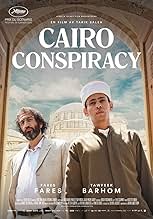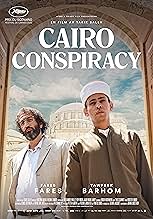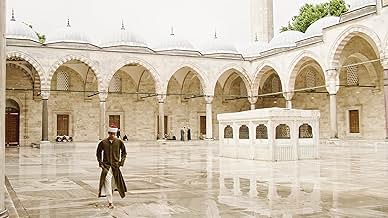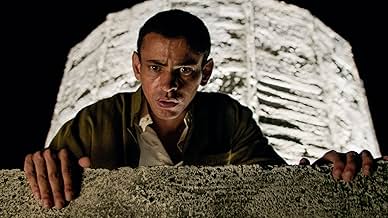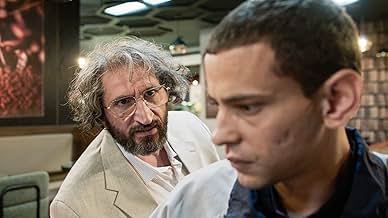CALIFICACIÓN DE IMDb
6.9/10
8.7 k
TU CALIFICACIÓN
Adam, hijo de un pescador, recibe el privilegio de estudiar en la Universidad Al-Azhar de El Cairo, el centro de poder del Islam Suní. Adam se convierte en un peón en el conflicto entre las ... Leer todoAdam, hijo de un pescador, recibe el privilegio de estudiar en la Universidad Al-Azhar de El Cairo, el centro de poder del Islam Suní. Adam se convierte en un peón en el conflicto entre las élites religiosas y políticas de Egipto.Adam, hijo de un pescador, recibe el privilegio de estudiar en la Universidad Al-Azhar de El Cairo, el centro de poder del Islam Suní. Adam se convierte en un peón en el conflicto entre las élites religiosas y políticas de Egipto.
- Dirección
- Guionista
- Elenco
- Premios
- 5 premios ganados y 21 nominaciones en total
Mohammad Bakri
- General Al Sakran
- (as Mohamad Bakri)
Makram Khoury
- Blind Sheikh Negm
- (as Makram J. Khoury)
Ahmed Laissaoui
- Raed
- (as Ahmed Lassaoui)
Hassan El Sayed
- Village Imam
- (as Hassan El-Sayed)
- Dirección
- Guionista
- Todo el elenco y el equipo
- Producción, taquilla y más en IMDbPro
Opiniones destacadas
Boy From Heaven is a watchable, exciting film where the action is set in Egypt and at the religious Al-Azhar University. The main character Adam, brilliantly played by Tawfeek Barhom gets a place at this university. He gives up his life as a fisherman and starts his studies. The film then takes a very surprising turn, becoming a suspense film, a thriller in an environment that is rarely depicted on film. Swedish Fares Fares has the other lead role, and together with Barhom they give life to the main characters in the film.
At a time when mainstream film is almost everything that gets a mention and that "everyone" must see, it is liberating to see such a film of this quality.
I would like to see more of Fares Fares and Tawfeek Barhom, and director Tarik Saleh has already shown that he can make quality films, both dramas and now thrillers.
Give this and other films that aren't necessarily on everyone's lips a chance. They give us diversity and very good entertainment.
At a time when mainstream film is almost everything that gets a mention and that "everyone" must see, it is liberating to see such a film of this quality.
I would like to see more of Fares Fares and Tawfeek Barhom, and director Tarik Saleh has already shown that he can make quality films, both dramas and now thrillers.
Give this and other films that aren't necessarily on everyone's lips a chance. They give us diversity and very good entertainment.
Tarik Saleh put his hand on a timeless aspect of Egyptian politics: the power interplay between the political leaders (the military) and the religious figures (Al Azhar). Never has this sensitive issue been addressed before. Which is ironically the very reason why this movie fails.
The reason why this issue was not addressed by Egyptian cinema (or "Hollywood-sur-Nil" as some used to call it back in its glamorous days) is simple: censorship. Egyptian moviemakers and actors would not be allowed to talk about this taboo. Indeed, this movie will not be played in Egyptian cinemas.
The direct consequence is that only foreign moviemakers can get away with making a movie that tackles this sensitive issue. And this is where things go wrong.
The movie - understandably - fails to capture any Egyptian essence. Dialogues are unnatural. Characters and attitudes are artificial. Add to this the fact that the cast is virtually Egyptian-free (for the reasons described above). They are therefore incapable of smoothing the dialogues into something that feels more natural.
While Tarik Saleh is from Egyptian descent, it is obvious from this movie that his relation to Egypt is, alas, too tenuous to make a movie that delves so deep into Egyptian social, political and religious realities.
Nevertheless, I am aware that my issue with this movie will only be shared by the Egyptian public. Therefore, to the extent that Tarik Saleh considers Boy from Heaven to be a a picture about Egypt by foreign filmmakers to foreign viewers, I would cut him some slack.
Still, the movie is riddled with espionnage clichés. Whichever you can think of, you will find in Boy from Heaven. Egyptian classical music is played at unlikely places. Scene transitions are often abrupt, evidencing issues with the montage.
More than once, the movie did feel like an average film school student's graduation project.
The reason why this issue was not addressed by Egyptian cinema (or "Hollywood-sur-Nil" as some used to call it back in its glamorous days) is simple: censorship. Egyptian moviemakers and actors would not be allowed to talk about this taboo. Indeed, this movie will not be played in Egyptian cinemas.
The direct consequence is that only foreign moviemakers can get away with making a movie that tackles this sensitive issue. And this is where things go wrong.
The movie - understandably - fails to capture any Egyptian essence. Dialogues are unnatural. Characters and attitudes are artificial. Add to this the fact that the cast is virtually Egyptian-free (for the reasons described above). They are therefore incapable of smoothing the dialogues into something that feels more natural.
While Tarik Saleh is from Egyptian descent, it is obvious from this movie that his relation to Egypt is, alas, too tenuous to make a movie that delves so deep into Egyptian social, political and religious realities.
Nevertheless, I am aware that my issue with this movie will only be shared by the Egyptian public. Therefore, to the extent that Tarik Saleh considers Boy from Heaven to be a a picture about Egypt by foreign filmmakers to foreign viewers, I would cut him some slack.
Still, the movie is riddled with espionnage clichés. Whichever you can think of, you will find in Boy from Heaven. Egyptian classical music is played at unlikely places. Scene transitions are often abrupt, evidencing issues with the montage.
More than once, the movie did feel like an average film school student's graduation project.
Fresh from a viewing of "The Nile Hilton incident", watching "Boy from heaven" consolidates the prowess of Tarek Saleh as a filmmaker: a robust and sensational story coupled with a minimalistic yet ever developing sense of flashy cinematography. This review is probably going to end up being a comparison between Saleh's newest film and his previous, so let's get the latter out of the way: "The Nile-Hilton incident" is a thriller crime film deeply rooted in the depiction of an Egyptian society that is on the brink of an Arab spring revolution. The story follows Fares Fares' character, a deeply corrupt cop who is assigned an investigation into a shady hotel murder that turns his life upside down. There are undoubtedly two things that should be said about this film: firstly, the story is pretty good! It is used as an apparatus to unravel the complexities of an Egyptian society in spiral, laden by crime, poverty and police corruption. However, a second point must be raised: the film lacks the kind of artistic and technical passages that tickle the imposter snob in me. It is very plainly shot and that can be said about hundreds of great films, but fortunately not about "Boy from heaven".
I never thought a red turban could have ever been this beautiful. This movie really superseded my expectations in terms of the cinematography while maintaining a solid loyalty to its great story. The film follows a young and candid young man who is chosen to enrol in the Azhar institute: an Islamic studies school that is regarded as a beacon of Islamic sciences in the middle east if not the world. But it is soon understood that this highly coveted institute hides behind it may dark secrets and political conflicts that rival in ruthlessness those inside the Egyptian quasi dictator regime. And Tawfeek Barhom's character finds himself in the middle of this highly volatile and dangerous battle between religion and state.
In this film, Tarek Saleh worked the religious imagery and the beauty of the spiritual ritual in a way that reminded me of Paolo Sorrentino's "The Young Pope": they both depicted in high detail the serenity of the religious system as well as its terrifying rigour. And Saleh got a few great shots of some red hats! Tarek Saleh has caught the eye of the international cinema community for quite a while, but now has cemented himself as one of the best directors in Egyptian cinema.
I never thought a red turban could have ever been this beautiful. This movie really superseded my expectations in terms of the cinematography while maintaining a solid loyalty to its great story. The film follows a young and candid young man who is chosen to enrol in the Azhar institute: an Islamic studies school that is regarded as a beacon of Islamic sciences in the middle east if not the world. But it is soon understood that this highly coveted institute hides behind it may dark secrets and political conflicts that rival in ruthlessness those inside the Egyptian quasi dictator regime. And Tawfeek Barhom's character finds himself in the middle of this highly volatile and dangerous battle between religion and state.
In this film, Tarek Saleh worked the religious imagery and the beauty of the spiritual ritual in a way that reminded me of Paolo Sorrentino's "The Young Pope": they both depicted in high detail the serenity of the religious system as well as its terrifying rigour. And Saleh got a few great shots of some red hats! Tarek Saleh has caught the eye of the international cinema community for quite a while, but now has cemented himself as one of the best directors in Egyptian cinema.
This movie has shaken Egypt to its very core, it has been deemed so provocative that it is BANNED. The director is Egyptian, the move is set in Cairo (yet filmed funnily enough in Istanbul because of the ban). It has yeilded award in the Cannes film festival, and it is simply put SUPERB.
The camera is well used, the atmosphere build up is immensely satisfying. And it ultimately proves the old saying "Man will be free when the last King has been strangled with the last priests entrials"- This is a CULT movie in the making. Unfortunately you will never see this film in Egypt.
The camera is well used, the atmosphere build up is immensely satisfying. And it ultimately proves the old saying "Man will be free when the last King has been strangled with the last priests entrials"- This is a CULT movie in the making. Unfortunately you will never see this film in Egypt.
If you are not Muslim, chances are you never heard about Al Azhar, which is a university teaching the Islam Sciences since 970 in Cairo, Egypt. They are the ones electing the Great Imam, and have been fully independent from the government since the very beginning. Governments have tried to get into it for centuries, to no avail. The movie starts with the Great Imam dying, and the government's attempt to choose who will be the next one, preferably on the government's side. You follow Adam, a young man who just arrived from his small village to learn about Islam. He gets involved in a situation that gets worse with every decision he makes, but he somehow still continues to learn about Islam between his investigations, prayers, and lack of sleep. He seems like a very pious guy, not understanding what he is getting himself into, and looks lost most of the time. The movie is a bit slow however, and could have used a bit more rhythm or maybe just to be shorter.
¿Sabías que…?
- TriviaA few days before the shooting in Egypt for Crimen en el Cairo (2017) was supposed to take place, director Tarik Saleh was publicly removed from the country and told not to come back. As a result, that movie was shot in Casablanca, Morocco. As he's still persona non grata in Egypt, he couldn't shoot Conspiración Divina (2022) there, thus despite being set in Cairo, the film was actually shot in Istanbul, Turkey, mostly in the Süleymanye mosque.
- ConexionesFeatured in Il était une fois...: La conspiration du Caire (2024)
Selecciones populares
Inicia sesión para calificar y agrega a la lista de videos para obtener recomendaciones personalizadas
- How long is Cairo Conspiracy?Con tecnología de Alexa
Detalles
- Fecha de lanzamiento
- Países de origen
- Sitios oficiales
- Idioma
- También se conoce como
- Cairo Conspiracy
- Locaciones de filmación
- Productoras
- Ver más créditos de la compañía en IMDbPro
Taquilla
- Presupuesto
- EUR 6,500,000 (estimado)
- Total a nivel mundial
- USD 4,867,691
- Tiempo de ejecución2 horas 6 minutos
- Color
- Mezcla de sonido
- Relación de aspecto
- 2.39 : 1
Contribuir a esta página
Sugiere una edición o agrega el contenido que falta

Principales brechas de datos
What is the Canadian French language plot outline for Conspiración Divina (2022)?
Responda

